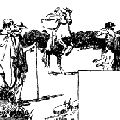37. Alexander the Great
"Men are but children of a larger growth." —DRYDEN.
While Rome is struggling into existence, while Carthage is growing in power on the opposite coast of Africa, let us take a look at a newly growing nation to the north of Greece, which threatened for a time the whole existing world. The story of this nation, which was known as Macedonia, is really the story of Alexander the Great, for it was due to his greatness alone, that Macedonia became the power she was.
Some two hundred miles to the north of Athens, lay the little mountainous country of Macedonia. It was of little or no importance in the then known world, until a king called Philip arose, who in the year 356 B.C. had a son called Alexander. Philip boasted his descent from Hercules, while his wife traced her lineage back to the hero Achilles, so that in the boy Alexander two lines of ancient northern kings were joined.
One story survives of Alexander's boyhood, which shows what stuff he was made of. A vicious horse was one day brought before King Philip in a field where he was standing with his wife and son. But the animal seemed so fierce and unmanageable, rearing high when the grooms tried to mount it, that Philip bade them take it away.
"What an excellent horse they are losing for want of skill and spirit to manage him," said the boy Alexander several times, until his father turned to him, saying, "Young man, you find fault with your elders, as if you could manage the horse better." "I could manage this horse better than others do," answered the boy. "And if you do not," said his father, "what will you pay for your rashness?" "I will pay the whole price of the horse," he answered bravely. At this the whole company laughed, but Alexander ran at once to the horse. Laying hold of the animal's bridle, he turned him first to the sun, for he noticed how the strong shadow disturbed the animal. Then letting him go forward a little, still keeping the reins in his hand and stroking him gently, when he found him beginning to grow fiery, he let fall his upper garment softly and with one nimble leap, securely mounted him. When he was seated, he drew in the bridle and curbed him gradually, without striking him. Then he let him go at full speed, urging him on with a commanding voice and touching him with his heel.
The king and assembled company looked on, in silent anxiety, till they saw the boy riding the horse back in triumph. Then they all burst out in loud applause, and his father kissed him with tears in his eyes as he cried in his joy, "O my son, look thee out a kingdom equal to thyself, for Macedonia is too small for thee." Philip now sent for Aristotle, the most learned and celebrated philosopher of his time, to come and teach his son, who was now thirteen. Aristotle had been the pupil of Plato, from whom he must have learnt much of Socrates, Plato's beloved master. Such a man, then, as this Aristotle—whose works are read and taught everywhere today—was likely to train the mind of this exceptional boy to the very best advantage.
A story is told, that Aristotle taught several princes, as well as Alexander, in the school by the shady Grove. One day he said to one of these kings' sons, "When, some day, you become king, what favour do you think you will show me, your teacher?" "You shall dine at my table, and I will make all show you honour and respect," answered the boy. "And you?" he inquired of another.
"I will make you my chief treasurer," answered the next. Then turning to Alexander he said, "And you, my son, what do you propose to do with me, your old teacher, when you come to sit on the throne of your father?" "What right have you to ask me of the future?" answered the boy.
"As I have no knowledge of the morrow, I can only say, that when the day and hour is come, then I will give you your answer." "Well said," cried his master, "well said, Alexander, world-monarch, for thou wilt one day be the greatest king of all." And Aristotle was right.

